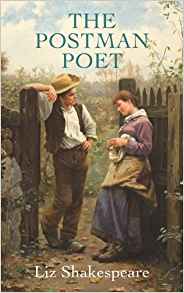The Postman Poet
Edward Capern, aka The Postman Poet, deserves wider recognition, not just for his pastoral poetry but for his concern for the poor and needy. Capern’s life, mainly spent in North Devon, spans the Victorian age. We follow his short-lived schooling to working in a lace-making factory, to carrying the Penny Post, walking miles delivering and collecting letters from the outlying villages around the beautiful lanes of North Devon in all weathers. He later married and had a son and daughter, who tragically died very young. On his long walks he absorbed the details of the landscape, the flora and fauna, life’s beauty and bounty as well as the unfairness of society which he recreated in his poetry. He was fortunate to gain entry to a local library and reading room, reading, thanks to the local entrepreneur, William Rook of Barnstaple, as many books as he could which was as much a life-saver to him as food. An enthusiastic autodidact and lifelong abstainer, he also gained the support of Charles Kingsley and Dickens. But it was Rook who helped most to publish his poetry. Another enthusiastic supporter was the philanthropist Baroness Burdett-Coutts who took him under her wing and even petitioned the prime minister, Lord Salisbury, to grant him a civil-list pension.
The author is well-versed in the social history of the period such as the factory acts, poor laws and the working-class dread of the workhouse. Although she is no polemicist, she clearly shows how with access to education and healthcare, life would be more equitable. Combining fiction, social history, and biography, The Postman Poet is an engaging and entertaining read that both brings a lump to one’s throat and joy to the heart. Highly recommended.










